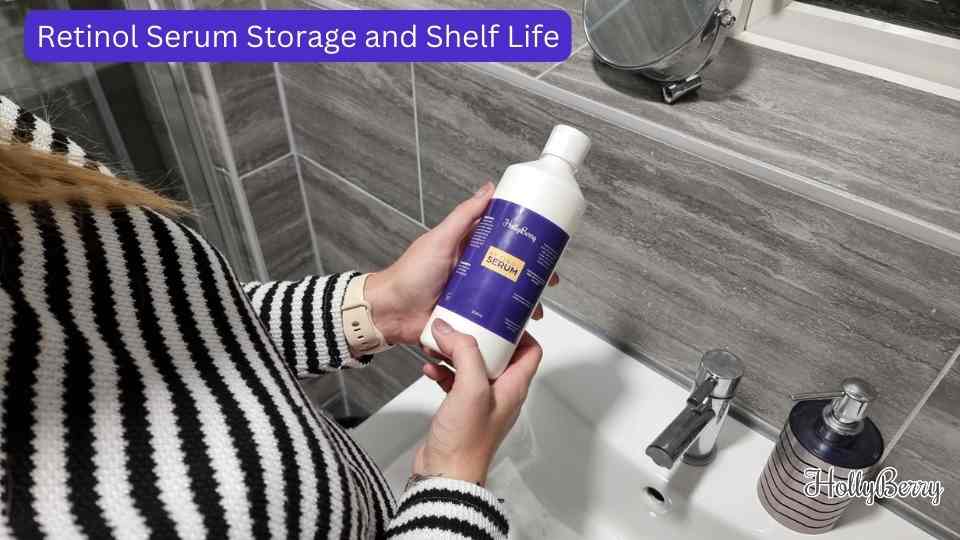
Retinol Serum Storage and Shelf Life
Share
Everything You Need to Know
Retinol serum is a popular skincare product that is known for its anti-aging benefits.
However, like all skincare products, it has a shelf life and requires proper storage to maintain its effectiveness.
In this article, we will explore the topic of retinol serum storage and shelf life to help you get the most out of your product.

Retinol is a sensitive ingredient that can easily degrade when exposed to air, light, and heat.
As a result, it is important to store retinol serum in a cool, dry place away from direct sunlight. Additionally, it is recommended to keep the product in its original packaging to prevent contamination and ensure proper storage.
By following these guidelines, you can help extend the shelf life of your retinol serum and maintain its potency.
It is also important to be aware of the shelf life of your retinol serum. Most retinol products have a shelf life of six to twelve months after opening, but this can vary depending on the specific formulation.
Using expired retinol serum can lead to skin irritation, breakouts, and other adverse effects. Therefore, it is recommended to check the expiration date of your product and discard it if it has expired.
By understanding the importance of proper storage and shelf life, you can ensure that your retinol serum remains effective and delivers the desired results.
Understanding Retinol Serum

Retinol serum is a popular skincare product that contains vitamin A in the form of retinoids. It is known for its anti-aging benefits, including reducing fine lines and wrinkles, improving skin texture, and promoting collagen production.
The formula of retinol serum typically includes a derivative of vitamin A called retinyl palmitate, which is converted into retinol by the skin.
The concentration of retinol in the serum can vary from product to product, with some containing higher concentrations than others.
It is important to note that retinol serum is a sensitive ingredient that can easily degrade when exposed to light and air.
This can reduce its effectiveness and even cause skin irritation. Therefore, it is essential to store retinol serum properly to ensure its shelf life and effectiveness.
When purchasing retinol serum, it is important to check the expiry date and ensure that the product is not expired. Expired retinol serum can cause adverse effects such as skin irritation, breakouts, and decreased effectiveness.
Overall, understanding the ingredients and formula of retinol serum, as well as proper storage and expiry dates, is crucial for achieving optimal results and avoiding negative side effects.
The Role of Retinol in Skincare
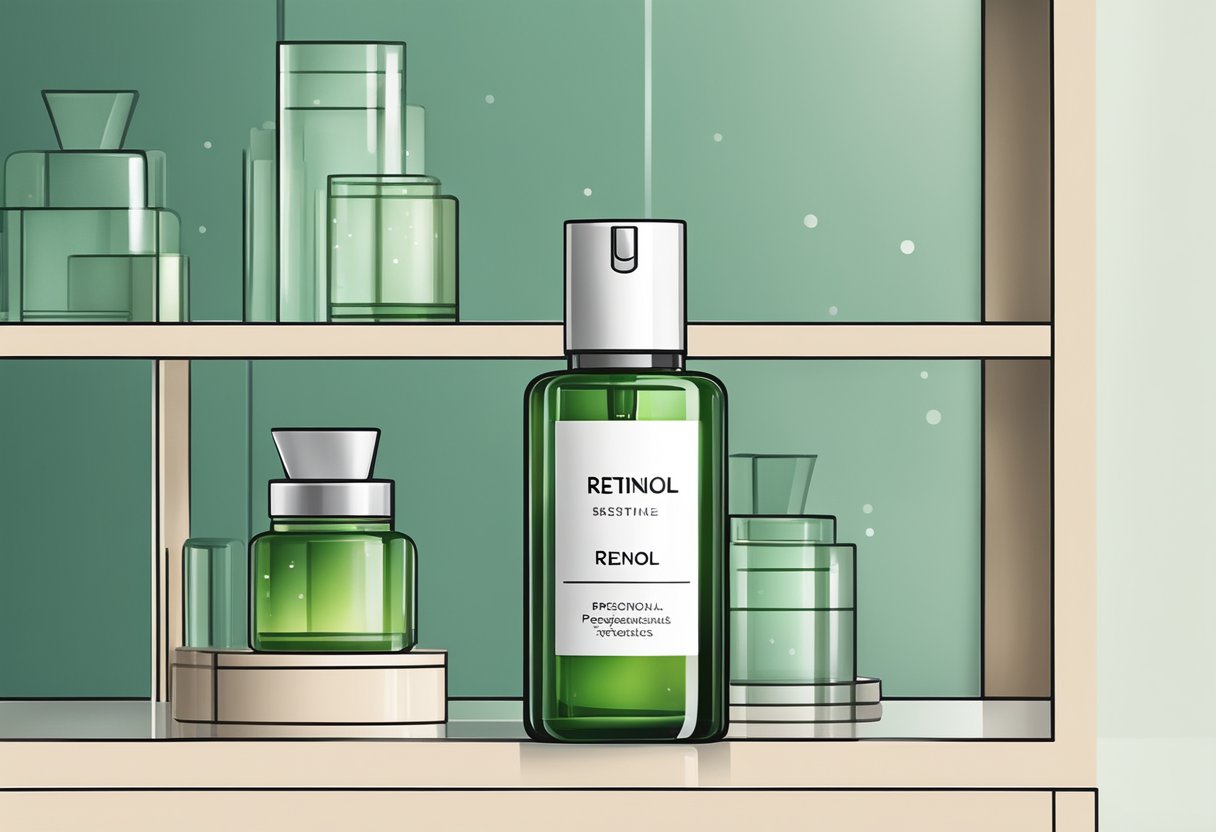
Retinol is a form of vitamin A that has been proven to be a powerful ingredient in skincare. It is a popular anti-aging ingredient that can help reduce the appearance of fine lines and wrinkles.
Retinol works by increasing cell turnover and collagen production, which helps to improve skin texture, tone, and firmness. It is also known to help with acne and breakouts.
Retinol is a potent ingredient, and its effectiveness can be affected by various factors such as storage and shelf life.
Retinol serums have a shelf life of around two years, and the active ingredients can lose their potency and effectiveness over time.
Therefore, it is essential to store retinol serums in a cool, dry place away from direct sunlight and out of reach of children and pets.
While retinol can provide significant benefits to the skin, it can also cause adverse effects, especially for those with sensitive skin. Retinol can cause skin irritation, redness, and dryness.
Therefore, it is essential to start with a low concentration of retinol and gradually increase the concentration over time.
Retinol is also an antioxidant and can help protect the skin from damage caused by free radicals.
It can also help improve skin hydration and reduce the appearance of pores. Retinol can be used in conjunction with other anti-aging ingredients and moisturizers to provide maximum benefits to the skin.
In summary, retinol is a powerful ingredient in skincare that can provide significant benefits to the skin, including anti-aging, improved skin texture and tone, and acne reduction.
However, it is essential to store retinol serums properly and start with a low concentration to avoid adverse effects. Retinol can be used in combination with other skincare ingredients to provide maximum benefits to the skin.
Different Types of Retinoids
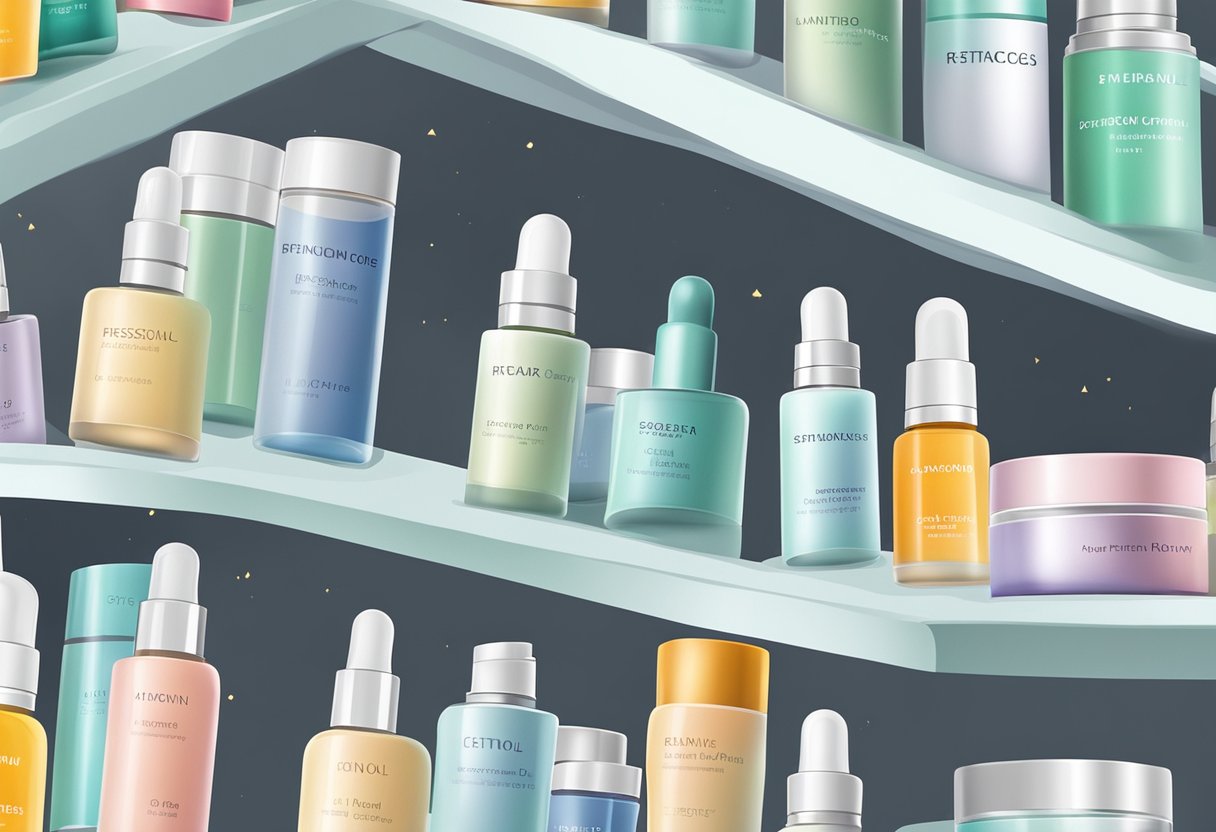
Retinoids are a class of compounds that are derived from vitamin A. They are used in skincare products for their anti-aging and acne-fighting properties. There are different types of retinoids available, each with its own unique properties and benefits.
One of the most common types of retinoids is Tretinoin, also known as Retin-A. It is a prescription-strength retinoid that is used to treat acne, fine lines, and wrinkles.
Tretinoin works by increasing cell turnover, which helps to unclog pores and reduce the appearance of fine lines and wrinkles. It is available in gel, cream, and liquid formulations.
Adapalene is another prescription retinoid that is used to treat acne. It is gentler than Tretinoin and is less likely to cause skin irritation. Adapalene works by reducing inflammation and preventing the formation of new acne lesions. It is available in gel and cream formulations.
Tazorac is a prescription-strength retinoid that is used to treat psoriasis and acne. It is one of the most potent topical retinoids available and is only available with a prescription.
Tazorac works by reducing inflammation and increasing cell turnover, which helps to unclog pores and reduce the appearance of fine lines and wrinkles.
Other types of retinoids include Retinyl Palmitate, Retinaldehyde, and Retinol. Retinol is a weaker form of retinoid that is available over-the-counter.
It is less irritating than prescription-strength retinoids but is still effective in reducing the appearance of fine lines and wrinkles.
It is important to note that prescription-strength retinoids should only be used under the guidance of a dermatologist. They can cause skin irritation and should be used with caution.
Over-the-counter retinoids like Retinol are generally safe to use but should still be used according to the manufacturer's instructions.
In conclusion, there are different types of retinoids available, each with its own unique properties and benefits. Prescription-strength retinoids like Tretinoin, Adapalene, and Tazorac should only be used under the guidance of a dermatologist.
Over-the-counter retinoids like Retinol are generally safe to use but should still be used according to the manufacturer's instructions.
Retinol Serum Storage Guidelines

Retinol is a powerful ingredient that can help reverse the signs of aging. However, it is also incredibly sensitive to light and air, which can reduce its effectiveness. Therefore, it is essential to store retinol serum properly to maintain its shelf life and effectiveness.
The following guidelines should be followed to ensure proper storage of retinol serum:
Store in a cool, dry place: Retinol serum should be stored in a cool and dry place away from direct sunlight and high temperatures. Exposure to heat and light can break down the retinol and reduce its effectiveness.
Use SPF: After using retinol serum, it is critical to wear SPF the day after use to protect the skin from any sun damage. Sun exposure can cause skin damage and reduce the effectiveness of retinol.
Use dark glass or opaque plastic: Retinol serum should be stored in dark glass or opaque plastic to protect it from light exposure. Light exposure can break down the retinol and reduce its effectiveness.
Use sealed tubes: Retinol serum should be stored in sealed tubes to prevent air exposure. Air exposure can cause the retinol to oxidize and reduce its effectiveness.
By following these guidelines, retinol serum can be stored properly, and its shelf life can be extended. Proper storage of retinol serum is essential to ensure its effectiveness and safety.
Understanding the Shelf Life of Retinol Serum
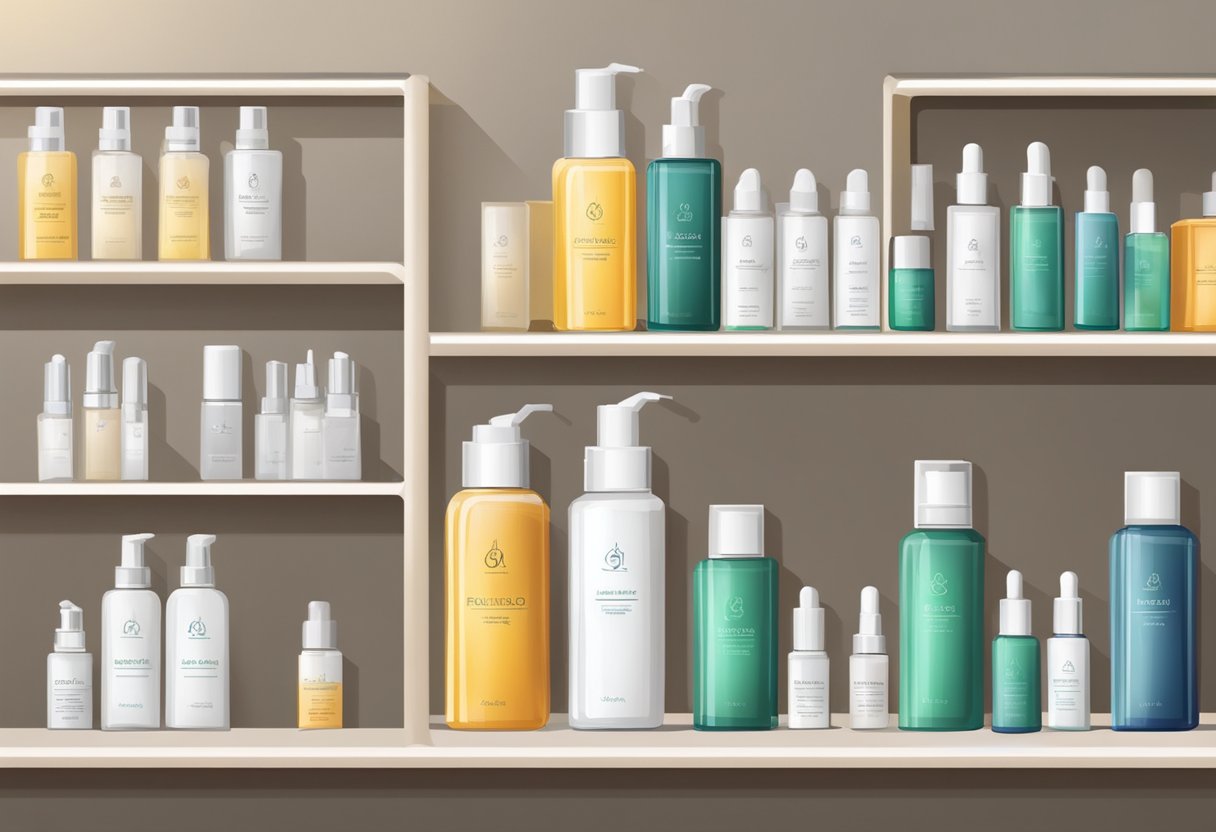
Retinol is a powerful ingredient that is commonly used in skincare products to combat the signs of aging. However, it is important to understand the shelf life of retinol serum to ensure that it remains effective and safe to use.
The shelf life of retinol serum typically ranges from six months to one year after opening.
The expiration date will depend on the specific formulation of the product and can usually be found on the packaging or bottle. It is important to check the expiration date before using the product as using expired retinol can lead to skin irritation, breakouts, and other adverse effects.
Factors that affect the shelf life of retinol serum include exposure to light, air, and heat. To prevent oxidation and maintain the potency of the product, it is recommended to store retinol serum in a cool, dry, and dark place.
Avoid storing the product in areas with direct sunlight or high temperatures, such as near windows or in the bathroom.
It is also important to properly seal the bottle after each use to prevent air from entering and causing the retinol to degrade. Some retinol serums may come with a batch code that can be used to track the manufacturing and expiration date of the product.
In addition, it is recommended to use retinol serum within three months of opening to ensure maximum effectiveness. If the product changes in color, consistency, or smell, it may indicate that it has expired and should be discarded.
Overall, understanding the shelf life of retinol serum and proper storage techniques can help ensure that the product remains effective and safe to use.
Signs of an Expired Retinol Product

Retinol is a powerful ingredient that can help reverse the signs of aging, but it has a limited shelf life. Using an expired retinol product can cause more harm than good, as it can lead to skin irritation, breakouts, and other undesirable effects.
Here are some signs to look out for to determine if your retinol product has expired:
Discoloration: If the product has changed colour and no longer looks like it did when you first bought it, it may be expired. Discoloration can be a sign of oxidation, which can reduce the effectiveness of retinol.
Flaking: If you notice that your skin is flaking or peeling after using your retinol product, it may be expired. This can be a sign that the product has lost its potency or that it has become too strong.
Strength: If you are not seeing any visible results from using your retinol product, it may be expired. Over time, retinol can lose its strength and become less effective.
Expired product: If the product has passed its expiration date, it is no longer safe to use. Using an expired product can lead to skin irritation, breakouts, and other undesirable effects.
Mold growth: If you notice any signs of mold growth in your retinol product, it is no longer safe to use. Mold can cause serious health problems and should be avoided at all costs.
Contamination: If the product has been contaminated with bacteria or other harmful substances, it is no longer safe to use. Contaminated products can cause skin irritation, breakouts, and other undesirable effects.
If you notice any of these signs, it is best to stop using the product and dispose of it properly. It is important to always store your retinol product in a cool, dry place away from direct sunlight and heat to prolong its shelf life.
Safety Considerations for Using Retinol Serum
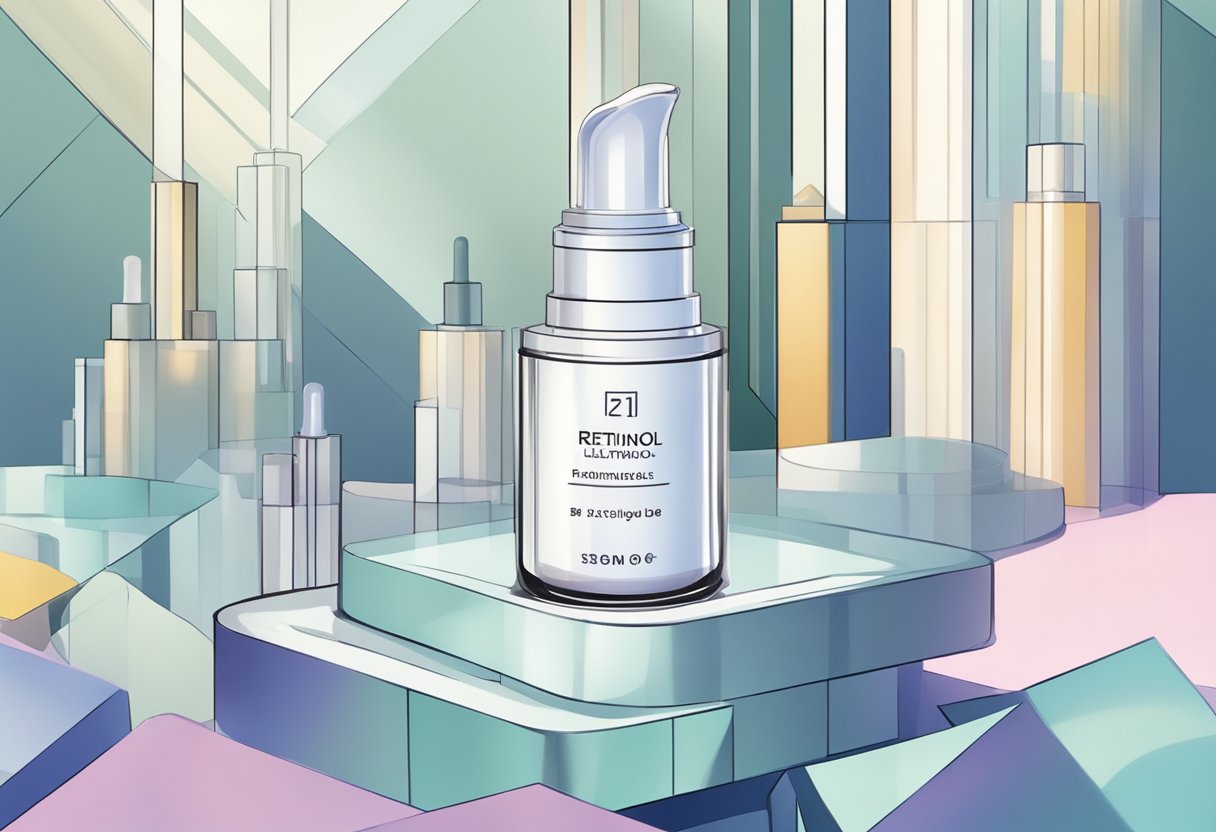
Retinol is a powerful ingredient that can help reverse the signs of aging, but it is also important to use it safely. Here are some safety considerations to keep in mind when using retinol serum:
Sunscreen
Retinol can make your skin more sensitive to the sun, so it is important to wear sunscreen when using retinol. Dermatologists recommend using a broad-spectrum sunscreen with an SPF of 30 or higher. Apply sunscreen every day, even on cloudy days, and reapply every two hours if you are outside.
Redness and Inflammation
Retinol can cause redness, dryness, and irritation, especially when you first start using it. If you experience redness or inflammation, reduce the frequency of use or take a break from using retinol for a few days. You can also try using a moisturizer or a gentle cleanser to help soothe your skin.
Pregnant or Breastfeeding
If you are pregnant or breastfeeding, it is important to talk to your doctor before using retinol. While topical retinoids are generally considered safe during pregnancy and breastfeeding, it is still best to consult a healthcare professional before using any skincare products.
Dermatologists
If you have sensitive skin or are new to using retinol, it may be helpful to consult a dermatologist. They can help you choose the right retinol product for your skin type and recommend a skincare routine that works for you.
Retinol Side Effects
Retinol can cause side effects such as redness, dryness, and peeling. These side effects are usually mild and go away on their own after a few weeks of use. If you experience severe side effects such as blistering or swelling, stop using retinol and consult a healthcare professional.
In conclusion, retinol can be a powerful tool in your skincare routine, but it is important to use it safely.
Wear sunscreen, be mindful of redness and inflammation, consult a healthcare professional if you are pregnant or breastfeeding, consider seeing a dermatologist, and be aware of potential side effects.
The Impact of Retinol on Skin Conditions
Retinol is a powerful ingredient that has been shown to have a positive impact on a variety of skin conditions. It can help to reduce the appearance of acne by unclogging pores and preventing the build-up of dead skin cells. Retinol can also help to reduce pigmentation and dark spots by promoting cell turnover and increasing elastin production.
Regular use of retinol can help to improve the overall texture and tone of the skin, leaving it looking smoother and more even. It can also help to reduce the appearance of fine lines and wrinkles, making it a popular ingredient in anti-ageing skincare products.
However, it is important to note that retinol can be irritating to some people, especially those with sensitive skin. It is recommended to start using retinol products slowly and gradually increase usage over time to allow the skin to adjust.
Proper application and storage of retinol products can also impact their effectiveness. It is important to use a gentle cleanser before applying retinol to ensure that the skin is clean and free of any dirt or impurities that could interfere with absorption.
Retinol products should also be stored in a cool, dry place away from direct sunlight and exposure to air to prevent degradation and maintain their potency.
Overall, retinol can be a beneficial ingredient for improving a variety of skin conditions, but it is important to use it properly and with caution to avoid any adverse effects.
Choosing the Right Retinol Product
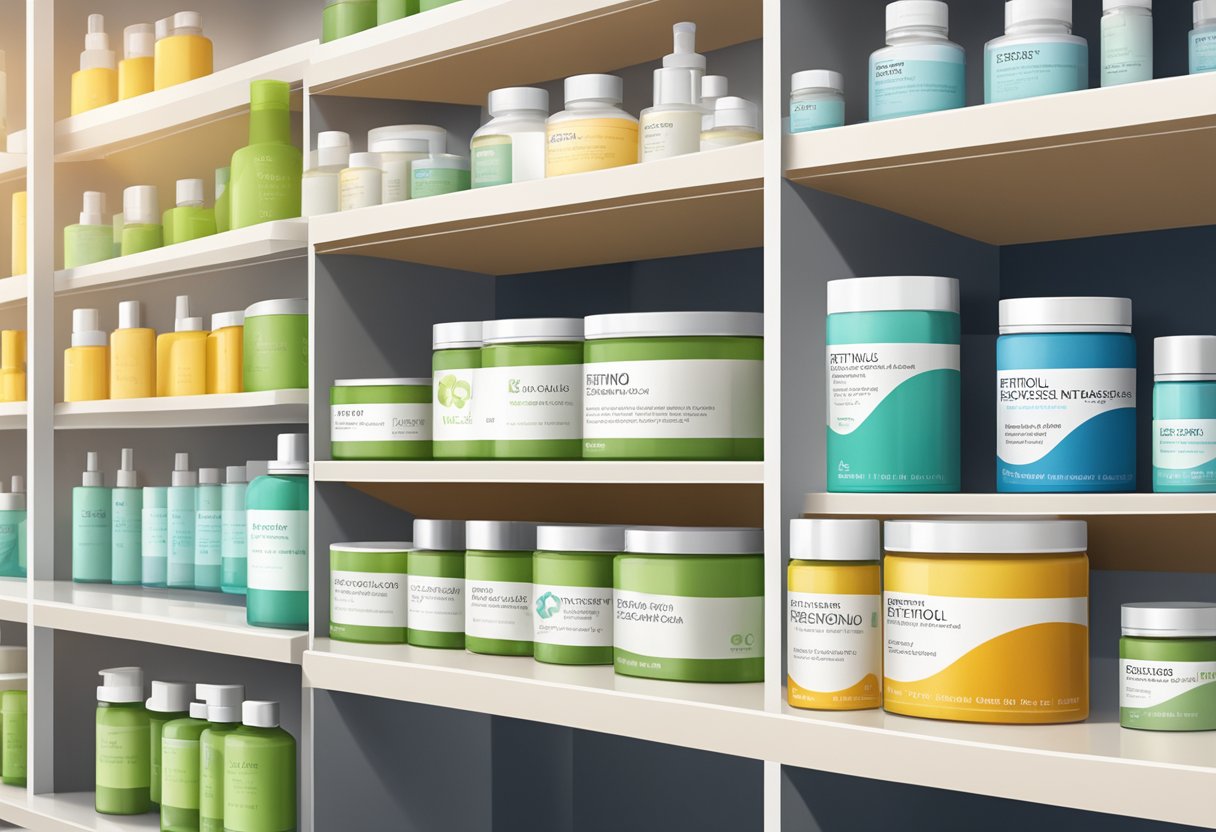
When choosing a retinol product, it's important to consider a few factors to ensure that you're getting the most out of the product and avoiding any potential negative side effects. Here are some things to keep in mind:
Consider Your Skincare Routine
Before adding a retinol product to your skincare routine, it's important to consider the other products you're using.
Retinol can be drying and irritating, so it's important to use it in conjunction with hydrating and soothing products. Additionally, it's best to use retinol at night, as it can make skin more sensitive to sunlight.
Look for Stable Retinol Creams
Retinol is a vitamin A derivative that can break down when exposed to light and air, which can reduce its effectiveness.
To ensure that you're getting the most out of your retinol product, look for stable formulations that are packaged in opaque, airtight containers. Additionally, avoid buying retinol products that have been sitting on store shelves for a long time, as they may have lost their potency.
Consider Your Skin Type
Retinol can be beneficial for all skin types, but it's important to choose a product that's appropriate for your individual needs. Those with dry skin may benefit from a retinol cream that contains hydrating ingredients like hyaluronic acid or ceramides, while those with oily skin may prefer a lightweight retinol oil.
Be Mindful of Bacteria
Retinol products can be a breeding ground for bacteria, which can lead to breakouts and other skin irritations.
To avoid this, it's important to use clean hands when applying retinol and to avoid dipping your fingers directly into the product. Instead, use a clean spatula or dropper to dispense the product.
Consider Anti-Aging Skincare
Retinol is a popular ingredient in anti-aging skincare products, as it can help to reduce the appearance of fine lines, wrinkles, and other signs of aging. When choosing a retinol product for anti-aging purposes, look for formulations that contain at least 0.1% retinol, as this is the minimum concentration needed to see results.
Overall, choosing the right retinol product involves considering your skincare routine, skin type, and desired outcomes. By doing so, you can ensure that you're getting the most out of your retinol product while avoiding any potential negative side effects.
